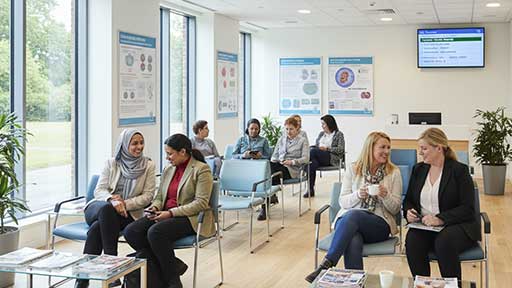
What These Studies Evaluate
Research teams conduct protocol-driven studies with predefined outcomes, for example:
- Medicines or treatment combinations for Type 2 diabetes (dose optimisation, add-on therapy).
- Continuous glucose monitoring (CGM) and other devices for data quality and safety monitoring.
- Clinician decision-support tools (including algorithm-assisted titration) used in routine care.
- Remote monitoring and digital diaries to assess adherence and trends.
- Structured nutrition and activity frameworks with objective endpoints.
Each study defines its endpoints, schedule of assessments, and monitoring rules in advance.
Who May Be Eligible
Inclusion/exclusion criteria appear in the Patient Information Sheet for each study. Typical examples:
- Adults (e.g., 18–75) with a confirmed diagnosis of Type 2 diabetes.
- On stable therapy for a defined period (e.g., metformin or other standard care).
- Able to attend scheduled clinic visits or complete remote check-ins.
- Without conflicting conditions or medicines that could affect safety or data integrity.
Final eligibility is confirmed during screening by the study team after informed consent.
How Participation Works (Typical Flow)
- Common ways people learn about studies include NHS research pages, university hospitals, and accredited UK research centres.
- Pre-screening (questionnaire or call) checks basic criteria.
- On-site screening confirms medical eligibility and explains procedures and time commitments.
- Informed consent details potential risks/benefits, data use, contacts, and your rights.
- Study period follows the protocol (clinic assessments, device use, diaries, follow-ups).
- End-of-study may include final assessments and data reconciliation.
Participation is always voluntary and can be discontinued at any time without affecting usual care.
Safety, Oversight & Ethics
- Ethics approval & regulation. UK studies are reviewed by ethics committees; sites use standard adverse-event reporting and escalation procedures.
- Participant rights. You may ask questions, pause, or withdraw at any point.
- Risk management. Protocols define monitoring, dose-adjustment rules where applicable, and stopping criteria.
- Care continuity. Usual treatment continues unless protocol-specific adjustments are agreed with the clinical team.
Data Handling & Privacy
- Defined purpose. Data are collected only for protocol-specified endpoints.
- Security & access. Research teams use secure systems and role-based access; retention periods are disclosed in consent materials.
- Transparency. You will be told what is collected, why, for how long, and whom to contact regarding your data.
Participant Commitments (Illustrative)
- Clinic visits: vitals, lab work, questionnaires, device checks, medication accountability (if applicable).
- At-home tasks: wearing a sensor as instructed, completing logs, and performing scheduled uploads.
- Communication: responding to safety checks and reporting symptoms between visits if requested.
These items describe procedural commitments only and do not imply personal benefit.
Finding Legitimate Studies
- Refer to NHS research pages, NIHR sites, university hospitals, or recognised UK research registries.
- Request the Patient Information Sheet and Informed Consent Form before deciding.
- Confirm ethics approval references and a direct contact (phone/email) for the study coordinator.
- Be cautious of sources that emphasise money, guaranteed acceptance, or outcomes.
- Decisions shouldn’t be based on expectations of any financial benefit; such expectations are not part of this informational page.
Frequently Asked Questions
Is participation guaranteed?
No. Acceptance depends on protocol criteria and site capacity.
Will I need to change my current treatment?
Only if specified in the protocol and agreed by you and your clinician. Many studies observe usual care with added measurements.
Are there personal health benefits?
Studies answer research questions; personal benefit cannot be promised. Known risks and potential benefits are described during consent.
Can I withdraw later?
Yes. You can stop at any time without penalty and without affecting your ongoing care.
Three quick, real-world scenarios to close
Scenario 1 — Living with diabetes?
In the UK, studies are underway exploring new methods and tools for managing the condition. Continuous monitoring, modern approaches, digital health solutions. Find out what current research is focusing on. All studies are conducted under clinical oversight. This guide explains how participation is typically organised and what to expect at each step.
Scenario 2 — Curious about new technologies being tested?
Smart sensors, emerging medicines, personalised decision-support — today’s research looks at practical ways to improve day-to-day management. These studies are run by trained teams with clear protocols and safety monitoring. On this page you’ll find a plain-English overview of how participation usually works and how eligibility is assessed.
Scenario 3 — Thinking about taking part in diabetes research?
UK studies follow ethics review, informed consent, and defined inclusion/exclusion criteria. The article includes a step-by-step outline (pre-screen → screening → consent → study visits → follow-up) so you understand the process before deciding. No guarantees of enrolment or personal benefit are made here.
Important Note
This page provides general information about UK diabetes research. It does not offer medical advice, does not advertise products or services, and makes no promises of enrolment, benefit, or any form of compensation. Always discuss potential research participation with your clinician before making any decision.